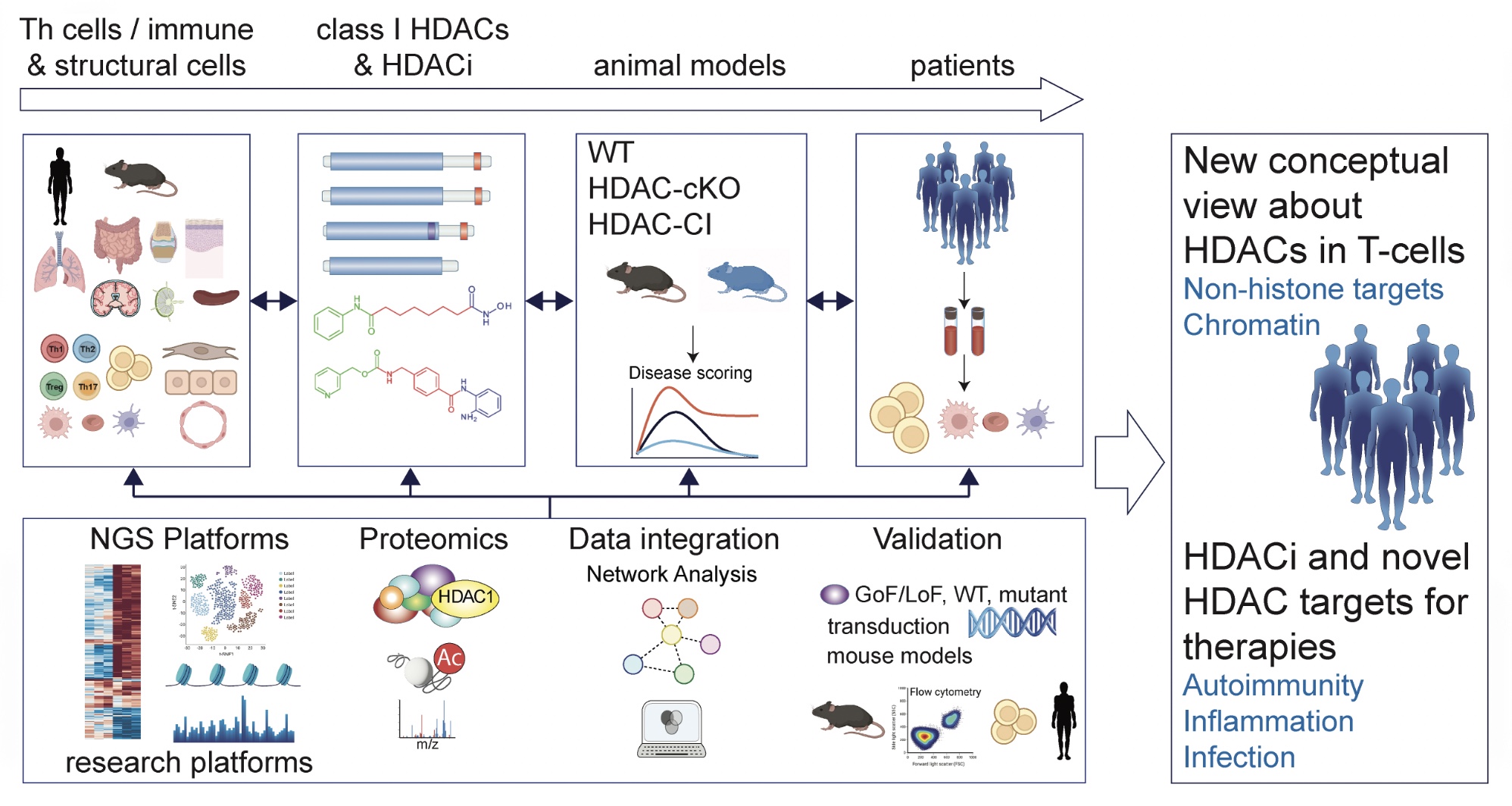Scientific concept of the SFB
The goal of this SFB is to provide a new conceptional view about HDAC function in T cels and to test essential regulatory roles of reversible lysine acetylation beyond histone modifications and epigenetic gene regulation in Th cells. To achieve these ambitious but feasible aims, our interdisciplinary consortium will focus on Th cells (and their interaction with other immune and structural cells) and a single class of HDACs with strong clinical potential (paradigm class I HDACs), thus providing a high degree of focus, coherence and potential for mechanistic insights as well as translational / biomedical relevance. We will exploit state-of-the art proteomics and next generation sequencing technologies, taking advantage of both animal models and human systems to provide an integrative model of class I HDAC function in T cells in homeostasis as well as the role of HDACs and HDACi for infection and autoimmunity. The expected outcome will fundamentally advance our understanding of how HDACs regulate Th cell lineages beyond the classical epigenetic control of gene expression. Further, the results of the SFB will provide a rationale for the application of isoform-selective HDACi for the treatment of T cell-mediated immune diseases and identify HDAC target genes and target proteins as potential novel drug targets.
SFB research areas
The SFB research program is structured into three major research areas:
- Area 1
We will study how the ablation/inhibition of HDAC members affects Th differentiation and plasticitiy, T cell-mediated immune diseases and infections with fungal pathogens. We will also study the effect of catalytically inactive HDACs that mimic HDACi treatment on -cell function to distinguish between catalytic and potential structural effects of HDACs. We aim to provide information about the type of T cell-mediated diseases that might be targetable by subclass-specific HDACi in humans. - Area 2
We will advance our understanding of how HDACs regulate CD4+ T cell-mediated immunity beyond the classical epigenetic control of gene expression and gene regulatory networks (GRNs). We will address to what extent HDACs exert their function through non-chromatin pathways by regulating non-histone proteins, a key unanswered question in the field. Moreover, class I HDACs operate in multiprotein complexes, but it is unknown whether and how complex composition changes in distinct cell types, upon differentiation or in autoimmunity and infectious diseases, or how the catalytic activity and target specificity of HDACs is regulated at the molecular level in a Th lineage-specific manner. - Area 3
We will integrate Th subset-specific datasets including mouse and human NGS and proteome profiles generated under standardized conditions across the SFB consortium. We aim to obtain an integrated view of HDAC-dependent chromatin landscapes, transcriptional changes and acetyl-proteome profiles, as well as the dynamics of HDAC interaction maps in health and disease. Based on these data, we will further validate HDAC targets in human T cells as well as in patients with rheumatoid arthritis (RA), an important autoimmune disease with a major involvement of Th cells.
Training
Postdocs and PhD students will work on cutting-edge research projects in a collaborative SFB research environment. All members of the SFB laboratories will actively contribute to the integration of new members employed by the SFB, ensuring excellent supervision and support. SFB PhD students will enroll in PhD programs at the hosting institutions. SFB principal investigators are faculty members of various thematic PhD programs at the MedUni Wien or at the University of Salzburg .
SFB postdocs will be also fully integrated in the SFB research teams. In addition to research training, we will foster their career towards independent PI level, for example through participation in postdoctoral training networks at MedUni Wien (organized by the Immunology Research Cluster) or at CeMM, which will provide several opportunities for networking within and beyond Vienna and Austria.
We encourage students and postdocs to engage in SFB activities beyond scientific research. PhD students and postdocs will have the opportunity to meet invited seminar speakers and guest professors, to organize SFB annual symposia, and to participate in SFB dissemination activities to the public. Additional training will entail manuscript and grant reviewing whenever possible. Together, these activities will help our young researchers to establish their own personal networks and to acquire complementary skills, which will be helpful for their future career.

